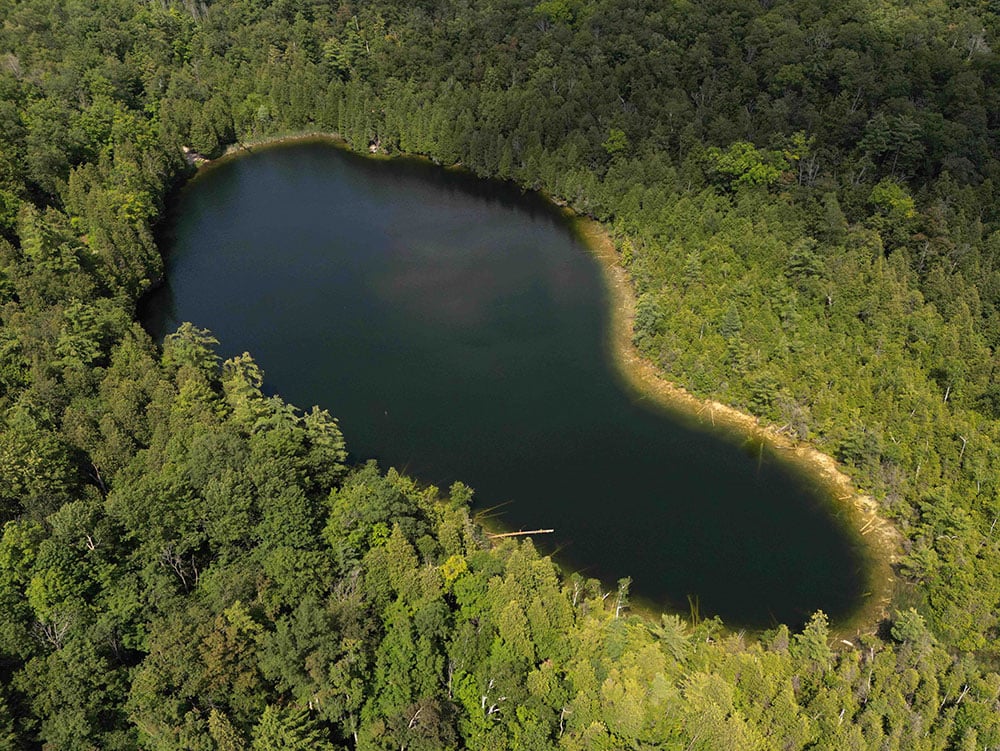Of course I support the nomination of Crawford Lake in Milton, Ontario, as the site marking the dawn of the Anthropocene epoch in 1950. But not just because we share a name. I’m delighted to be part of the generation born in the Holocene, the geologic epoch that followed the Pleistocene and in which human civilizations emerged, yet living into the Anthropocene, the current epoch when humanity has made itself a truly global agent of environmental change.
The nomination was proposed in February 2023 by Francine McCarthy, a micropaleontologist at Brock University, in the appropriately named journal The Anthropocene Review. Crawford Lake has received growing but not universal support from other scientists.
Formed in a collapsed limestone sinkhole when the glaciers retreated, the lake is unusual in having little or no circulation in its lower depths. Materials washed into the lake settle on the bottom in distinct layers, called strata, usually sealed off by a “varve” — a layer of calcite that caps each year’s sedimentation. The strata have been undisturbed for millennia.
Like the rings of a tree, the strata can be counted and analyzed to determine what was going in a particular year: the kinds of trees and bushes growing nearby, and the changing ecosystem of the lake itself.
Crawford Lake drew scientists’ interest when corn pollen was found in strata dating to the 13th, 14th and 15th centuries. Between the years 1268 and 1486, one report states Iroquoian farmers settled along the lake in longhouses. They put so many nutrients into the lake that they changed its chemistry and the ecosystem of microscopic diatoms and rotifers. Then the farmers vanished.
By 1867, Europeans were farming around Crawford Lake, and again the nutrients they added to the lake were preserved in the strata. So were the soot and chemicals of growing industries around the Great Lakes. The Dust Bowl years of the Dirty ‘30s left their mark, and after the Second World War the lake recorded the growing residues of the Great Acceleration, when human activity became a genuinely geological force. We tripled in population, consumed fossil fuels in decades that had taken hundreds of millions of years to form, drove species into extinction, and disrupted most of the planet’s ecosystems (including our own).
One recent book estimates that the present biomass of large land mammals consists of 30 per cent humans, 67 per cent domestic animals and three per cent wild animals.
You had to be there
In the lake stratum laid down in 1952, researchers found the clincher: plutonium, a human-made radioactive element used as part of the trigger for the first hydrogen bomb. The Americans had tested it in the South Pacific that year, part of an ongoing series of atmospheric tests conducted by the U.S., the U.S.S.R, Britain, France and eventually China.
Like everyone else alive in the 1950s and '60s, I must have acquired my own share of plutonium, not to mention strontium-90, which the body absorbs like calcium, and many other radioactive isotopes.
Cold Warriors of that era were quite prepared to shorten the lives of their own people if it would help ensure the instant deaths of whoever the enemy might turn out to be.
It took years of diplomacy just to move the tests underground. I know it sounds weird. You had to be there.
‘Peak Humanity’
Still, most of my generation of white North American males, born in the late Holocene and growing up in the early Anthropocene, have been the most fortunate generation in human history. The Great Acceleration has given us wealth undreamed-of before the Industrial Revolution.
We have used it to generate still more wealth, while passing the costs along to other species and less privileged people around the world — including our own children and grandchildren.
My generation, born in the 1930s and 1940s, really is Peak Humanity.
Some critics of the Anthropocene say it’s much too soon to designate it as a full-blown epoch, which is usually millions of years long. But it seems very clear that what we have achieved in the last 70 years will scourge the planet for a very, very long time. The Sixth Extinction is still going on. A few tough “weed species” like rats and raccoons will survive and perhaps evolve into intelligent beings with an interest in their origins.
If Crawford Lake also survives, our successors will likely find still more strata laid down. If they find the 1952 stratum containing plutonium, they will see it as undeniable evidence of a long-dead civilization, as clear a marker as the iridium layer that marks the death of the dinosaurs 66 million years ago.
And just a few strata above the plutonium, they will find fossilized microplastics and traces of “forever chemicals” — a clear signal that however long the Anthropocene may last, its creators did not last long at all. ![]()
Read more: Environment

















Tyee Commenting Guidelines
Comments that violate guidelines risk being deleted, and violations may result in a temporary or permanent user ban. Maintain the spirit of good conversation to stay in the discussion and be patient with moderators. Comments are reviewed regularly but not in real time.
Do:
Do not: